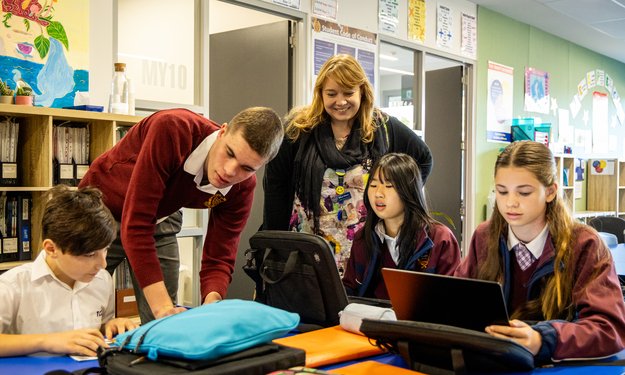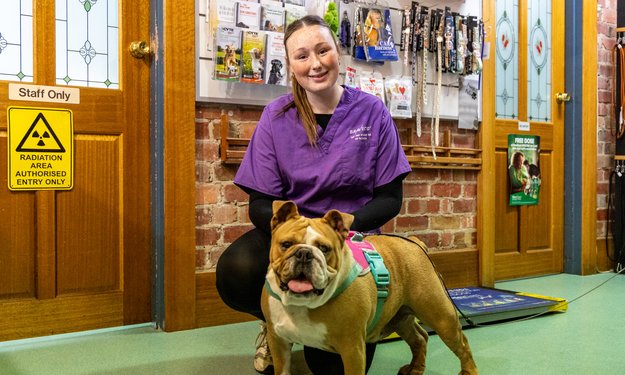Developing the Whole Person
Our Learning Community Leaders work closely with our students to ensure their learning pathway is best suited to their needs. Everybody’s academic experience is different and our young people are supported on their journey of self-discovery as they become equipped to discover their purpose and choose their own path to the future.
Year 7 is a foundation year for our students and everyone will study the same core units over two semesters. These subjects are taught in the students’ Homeroom groups to allow for a smoother transition from primary schooling.
Additionally, Year 7 students rotate through all the Elective units, which provides a effective method of discovering their strengths and interests.
Behaviours for Learning
At Trinity College we foster a culture of high expectations that embraces our Collee mission to nurture challenge and insp;ire our students. Our Behaviours for Learning initiative for Years 7 and 8 is a progressive practice of encouraging calm spaces in our classrooms.
There are five pillars to the Behaviours for Learning framework:
- Line up – encourages a change of pace and attitude from the breaktime to the classroom.
- Be prepared – ensuring that learning can commence immediately and the time spent in the classroom is positive and effective.
- Seating plan – provides a place where students feel safe and supported.
- Exit lanyards – safety is a priority and students' movement out of the classroom can be monitored.
- Departure – leaving the classroom for a brief break and changeover.
The benefits of implementing a program like Behaviours for Learning are based on the high expectations that we set here at Trinity. If a classroom is a calm space then learning can occur with minimal disruptions and maximum effectiveness. It has been proven that calm classroom techniques have an outcome of improved student engagement within the classroom, leading to improved outcomes within the curriculum and higher levels of wellbeing for our young people overall.
Camp
The Year 7 camp generally takes place in Week 2 of the year. Students and teachers venture down to Kangaroobie in Princetown and enjoy a jam-packed schedule of activities carefully curated to offer challenge and build teamwork and connection.
The Year 8 curriculum is a progression from Year 7 and students will continue to study their core subjects in their homeroom groups.
Core Subjects
Religious Education, Digital Technologies, English, Health and Physical Education, Humanities, Languages: Indonesian, Mathematics, Science.
Elective Subjects
During the year, all Year 8 students must study four electives over the year. In order to help students ensure a breadth of curriculum choices, Year 8 students will be required to choose on elective from each of the following Learning Areas:
- Performing Arts
- Visual Arts
- Design and Technology
- Digital Technology
Year 9 students have a wider choice of subject selections than in Year 8. In total, students will be required to complete 14 units for the year: Nine units will be from their Core subjects and five units from their Elective subjects.
Experiental Learning at Year 9
As part of an innovative curriculum that aims to awaken and stimulate the intelligence, Year 9 students participate in Experiential Learning activities throughout the year. These constructive experiences engage our students in such a way as to realise their academic and personal potential. Currently, Experiential Learning at Trinity takes the form of two main activities:
Beechy Rail Trail: An expedition learning experience where students hike the Beechy Rail Trail with an overnight tent camping experience at Gellibrand. Before departing and upon return reflection, critical analysis and synthesis exercises take place in Pastoral Care classes. The hike itself takes place in late April or early May and provides students with the opportunity to foster relationships with the natural world as well as encouraging senses of self-discovery, adventure and triumph.
Melbourne Experience: The popular four-day, Year 9 Melbourne Experience takes place in third term. This trip to Melbourne is part of the Year 9 Programme that has been devised to enhance and engage students with their learning experiences.
Activities throughout the experience are designed to broaden horizons and develop resilience and independence, with student safety a priority at all times. The popular four-day camp fosters teamwork, leadership skills and generates lifelong memories.
Year 10 students are developing the characteristics of leaders of the school. The expectation and study workload increases as students tackle more challenging subject matter and have the opportunity to complete an advanced VCE Unit or VET subject.
Camp
The Year 10 camp takes place at the end of Term 1. Based in and around the Surf Coast, the theme of the camp is very much about experiencing the outdoors. Students pitch and sleep in tents and prepare all of their own food. They undertake a series of adventure style activities ranging from surfing, abseiling, rock climbing to group initiative games.
Year 11 and 12 students have the opportunity to choose two educational certificates: the Victorian Certificate of Education (VCE) or the VCE Vocational Major (VCE VM). Both the VCE and VCE VM students also have the option to choose a Vocational Education and Training (VET) course to complement their studies. These certificates enable students to devise a personal curriculum which is best suited to their individual interests and abilities.
Curriculum Handbooks
At Trinity, we provide opportunities for students to learn within a positive culture that values learning and humanity. In doing so, the spiritual, intellectual, physical, emotional and social dimensions of each student can be best realised. The curriculum is divided into 11 Learning Areas with various subjects relating to that faculty.
Early in Term 3, the students' Curriculum Handbooks are published with information on subjects offered for the following year.
Students are informed about the subjects on offer in information sessions and are encouraged to seek information from their Homeroom Mentor, Year Level Coordinator and subject teachers. All students and their parents can also seek an interview with the Deputy Principal or the Directors of Learning to guide them in their selection.


